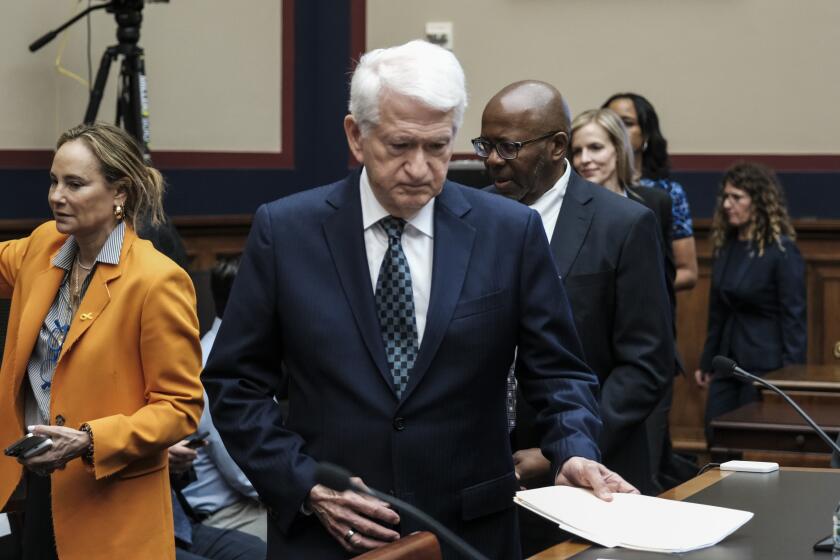Pet Projects Have Spending Bill Over a Barrel
A $9.4-billion catchall spending bill that would bail out the farm credit system and boost aid for the homeless sits bogged down in the Senate, a victim of Congress’ irresistible urge to lard such legislation with pork-barrel items.
Senate leaders are waiting for worsening farm problems to increase pressure to pass the bill. But many senators--both Republicans and Democrats--say the bill should be stripped of special projects that they charge are “classic examples” of unwillingness to accept budgetary discipline.
Among the items cited by opponents: a measure to lift the cap on government subsidies to beekeepers that would benefit only 20 farmers in California, the Dakotas and a few other states; $10 million to Louisiana State University for a nutrition center that the state has been unwilling to fund, and nearly $2 million for what the Reagan Administration terms “objectionable” improvements to irrigation canals in Idaho.
One of Oldest Traditions
The practice by members of Congress of steering money to their constituents is one of the government’s oldest traditions. Today’s huge budget deficits have changed the rules but have not ended the game.
Huge water projects, new highways and similar multibillion-dollar “bricks and mortar” projects--the pork barrel of the past--are gone. Today’s favors for the voters, as the current spending bill shows, are more likely to be found in agricultural subsidies, university research grants and national parks.
In addition, such projects are often attached to measures that are considered urgent, like the supplemental appropriations bill now stuck in the Senate.
The bill provides $100 million for additional shelter, food and medical care for the nation’s homeless. But the urgency in the current bill is a product of ballooning farm debts. The Commodity Credit Corp., a government agency that lends money to farmers, has reached its credit limit.
Need Funds for Seeds
Without CCC loans, many farmers will be without money to put seeds in the ground as spring planting season begins in key Midwestern agricultural states.
Senate leaders calculate that, as planting deadlines approach, complaints by farmers will push farm-state Republicans into supporting the entire bill, special projects and all, to get the CCC money. Senate Majority Leader Robert C. Byrd (D-W.Va.) has said he intends to let the bill sit until Republican votes for it materialize.
But Republicans are not the only ones who are balking. “There’s over a billion dollars of non-emergency appropriations in here,” liberal Democratic Sen. Carl Levin of Michigan says of the catchall bill. “Why are we waiving the budget for that?”
The bill’s supporters say opponents are exaggerating the amount of non-emergency money it contains. “You can go down the list and talk about this project or that,” says Sen. J. Bennett Johnston (D-La.), a senior member of the Senate Appropriations Committee. But if you add them up, he insists, the spending comes to “only one-half of 1%” of the bill’s total.
“It’s not a perfect bill,” he says. “If it was, I would have a lot more projects in it.”
Louisiana Profiting
Despite his disclaimers, Johnston has had considerable success in fitting projects into the bill. For example, the measure would provide $10 million to LSU and direct the Agriculture Department to use it as a permanent nutrition research center, guaranteeing a flow of federal dollars in the future.
Johnston’s favors for his constituents also include $5 million to buy more land for Louisiana’s Bayou Sauvage National Wildlife Refuge, which the Administration calls a “low-priority project” designed to “resolve a local development issue” in New Orleans.
The bill also would delay a federal requirement that Louisiana’s shrimpers put devices on their nets to protect the lives of endangered sea turtles. Environmental groups, while unhappy with this postponement, say they will not object to it if Congress does not try to extend the delay past the current fiscal year, which ends Sept. 30.
Republicans also have a share of the money in the bill, which would give the Interior Department $2.1 million for unspecified federal lands management. Although the bill’s explanatory report says nothing about where most of that funding is to go, Administration officials say the money was added at the request of Sen. James A. McClure (R-Ida.) and would subsidize improvements in irrigation canals in his state.
And then there are the bees.
Like most farm commodities, honey receives a federal subsidy, which amounted to roughly $100 million last year. The government lends money to farmers, taking honey as collateral at a rate of about 63 cents per pound. Farmers can then buy their honey back from the government at the free-market world price, now around 40 cents a pound. The farmers keep the difference.
Cap on Honey Subsidies
Last year, Congress put a $250,000 annual cap on the amount of honey farmers could put into the program. But last month, Sen. Quentin N. Burdick (D-N.D.) put language in the appropriations bill that would repeal the cap. Burdick is a member of the Appropriations Committee whose state is home to the nation’s busiest beekeepers. California comes in second most years.
Honey producers insist that the subsidy is needed to allow them to compete with imports. But Sen. Dan Quayle (R-Ind.), a longtime opponent of the honey program, calls the project “a sweet rip-off.”
Quayle has said he will try to keep the cap in place and estimates that removing it would cost millions. But Agriculture Department officials say that some honey farmers have discovered loopholes that allow them to avoid the cap.
“We thought it would save money,” says one official of Quayle’s effort to preserve the cap. Now, however, the official says Quayle’s move may be too late.
More to Read
Start your day right
Sign up for Essential California for news, features and recommendations from the L.A. Times and beyond in your inbox six days a week.
You may occasionally receive promotional content from the Los Angeles Times.







